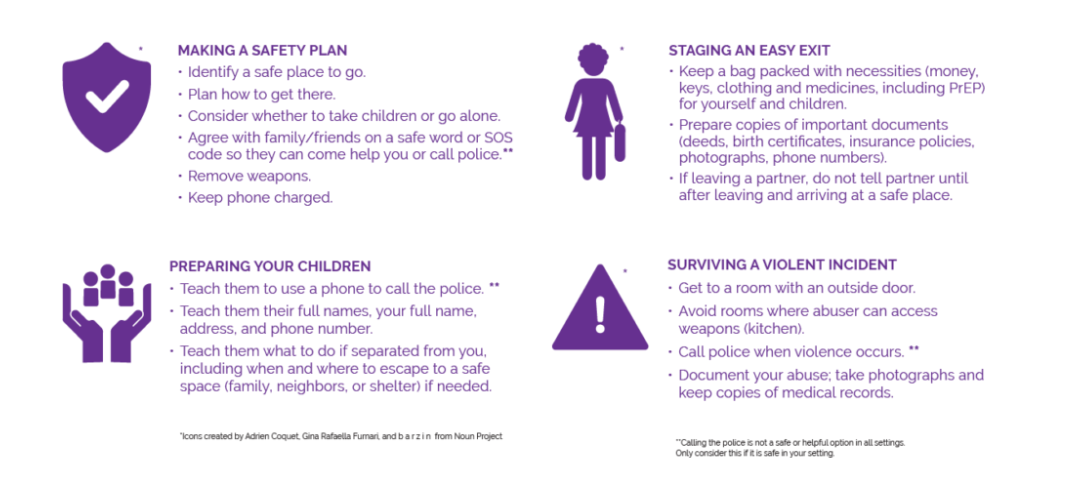

Being in a relationship with someone who cares for you is a great experience. But not all relationships are healthy and some can even be abusive. It’s important to know the difference. Remember, when someone cares for you, you will feel safe, respected, and free to be yourself. You should never feel afraid of the person you are dating.
Being in a relationship where your partner is abusive to you is known as intimate partner violence, which puts your safety at risk. It’s not always easy to immediately walk out of an abusive relationship. But working on a plan to make sure that you are safe and ready to go when it’s time is a good first step. Abuse comes in many forms and is not only physical.
You may or may not be ready to walk away from an unhealthy relationship today but having a safety plan is important. A safety plan is a plan that you
think about and start working on in case your partner is abusive toward you again or if you’ve made the decision to leave and need to plan before time.
Here are some things to think about when working on your safety plan:

It is also a good idea to share your safety plan with someone close to you who you trust so they can help you.
An abusive partner can sometimes become more violent or scare you so that you don’t leave. This is why it’s important
to have a safety plan and get as much support from your loved ones.
Remember, abuse in any form is NEVER your fault and help is available for you.
It’s also important to know that abuse is not limited to relationships between men and women. Abuse can happen in any kind of relationship.
You can go to your local clinic and speak to a healthcare provider, social worker, counsellor, or psychologist and get the support you need.
It’s also important to report your abuser at your nearest police station.
Talking is a big way of communicating. But there are other ways to communicate such as your volume when you speak, your body language, and facial expressions. Are you and your partner struggling with communicating properly? Get tips on how to improve.

It is normal to have disagreements in a relationship, but there are ways to help you and your partner fight less and make sure your fights don’t affect your relationship. Find out how you and your partner can have fewer fights.
When you are in a relationship with someone older, it can be complicated. An older boyfriend or girlfriend might have
access to things you don’t. They might live on their own, drive a nice car and have money to buy you nice things.
All these may lead you to feel like you are expected to do some things to keep the relationship,
like have sex with them.
Because of the age difference, your older partner may want to be in control of the
relationship. For example, they may want to make all decisions for both of you, and may tell you what to wear and
who to be friends with. You need to be able to fully express yourself and be heard in any relationship so be sure
that you are in the relationship because you want to be in it, not because you’re forced to.
It is very important to get tested for HIV together so you can be in control of your health. Research has shown that younger women often get HIV from older men. It is also important to use condoms every time you have sex and to be comfortable talking to your partner about this. If they care, they will respect your wishes because using condoms will keep both of you safe.
If you are in a relationship with someone much older or younger, remember that it could be against the law. In South Africa, if you are under the age of 16 it is illegal to date anyone over the age of 18. Also, if you have sex with someone under the age of 16 when you are older, then you are breaking the law. If you are struggling to get out of a relationship you no longer want, it is always wise to talk to an adult or someone you can trust.loveLife is also here for you.
Someone who gives you money or buys you gifts in return for sexual or other favours is referred to as a “blesser”
“sugar daddy” or “sugar mummy”. This person can be someone who is the same age as you but has access to more money
or a fancy car. It can also be someone who is older. They often give you these gifts, money, take you to fancy places
and expect sexual favours in return.
The gifts can be cash, clothing, handbags, rent, airtime or cellphone contracts, groceries, or trips.
If you feel like you ‘owe’ someone sex or need to ‘thank’ them by having sex with them, it means they are taking
advantage of you and you need to relook at the relationship and decide whether this is what you want.
There’s nothing wrong with your partner taking you to nice places, buying you nice things, or supporting you financially. But it’s not okay when they pressure you to have sex with them because they are giving you things.
It can be difficult to leave a relationship with a blesser because they may be helping you financially with school or at home, but no one should make you do what you don’t want to. If you need help, you can call or send a Please Call Me to loveLife to get non-judgmental and anonymous advice or counselling for free.
Breakups are not easy, and they can leave you with a broken heart and anger. Everyone handles breakups differently, but here are a few tips on what can help you deal with one: